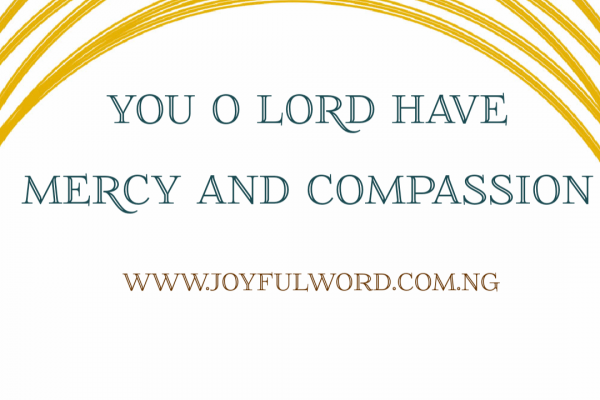YOU O LORD HAVE MERCY AND COMPASSION
YOU O LORD HAVE MERCY AND COMPASSION

YOU O LORD HAVE MERCY AND COMPASSION
(WEDNESDAY, OCTOBER 09, 2019)
In the Book of Jonah, God has told the people of Nineveh, repent or else they shall be destroyed. The Ninevites choose to repent and God spares them. And Jonah is furious. Jonah wants God to destroy Nineveh. Jonah is so angry that he asks God to take his life. The Lord, in His kindness, asks Jonah, "Do you have reason to be angry?" And then Jonah camps out east of Nineveh, like a vulture, hoping God will yet destroy the city. It’s hot. And God provides a plant for shade for Jonah. When the plant dies, Jonah, again, is furious and asks God to kill Him. God uses Jonah’s concern over the plant as a lesson to him about the importance of the people of Nineveh to God.
The psalmist proclaims: Lord, you are merciful and gracious. For you, O Lord, are good and forgiving. And in Luke, Jesus teaches the disciples how to pray. Ask the Lord for the forgiveness of our sins just as we forgive those who sin against us. Christ understands the importance of forgiveness in our relationship with God and in how we relate to each other.
Anger and frustration are common phenomena that happen to us often. At times, many choose to be angry with little or no provocation at all. We can choose to be angry or not to be angry depending on what is going on in our lives at any giving time. Often many of us are doing anger a disservice by not giving it the due discernment that we give to other emotions. For example, we spend a lot of time discerning love. Perhaps we do not spend nearly enough time contemplating our anger or other negative emotions.
Today’s story of Jonah perfectly addresses the issue of petty anger. Jonah is furious that our merciful God will not punish the Ninevites. Jonah even grows angry over the death of a plant; which God had given him.
How often do we actually have reason to be angry? Are we quite a passionate and extroverted person.
These characteristics make it rare for those around us to need to question how we are feeling about a given situation, whether positive or negative. God’s question to Jonah is poignant and piercing. Have we reason to be angry? Why don’t we ask ourselves that question more frequently?
No discussion of anger would be complete without mention of righteous anger. It’s hard to find a chapter in the Gospels where Jesus is not calling someone a hypocrite, flipping a table, making a whip, angrily reacting another group especially the Scribes and the Pharisees, or getting frustrated with His disciples. His actions were not sin. But they were indeed anger and they did indeed incite a reaction from His opponents.
Thus, they didn’t kill Him for being a nice guy.
Part of the differentiation between Jesus’ type of anger and the type we frequently employ is reason and intent. Are we displaying anger for our personal gain? Or are we angry out of defence of someone or of morality? For example, we all should be disgusted and angry when we see a lot of injustices, marginalization, frustrations, incessant killings and other crimes going on in the land. At the same time, there are altogether too many times in life that we feel entitled to our anger.
In the "Our Father," we're reminded that prayer should link us to a community and that we can't entirely separate our relationship with God from our relationships with other people. This is a prayer that is grounded in our very ordinary daily needs: the need to earn a living and the need to get along with other people. This prayer recognizes that God is part of these essential, mundane aspects of life. This model of prayer encourages us to talk to God about what's going on in our daily lives.
Let Us Pray: Lord Jesus, give me grace to to repent of my sins and to seek holiness of life. May your grace help me always. Amen

